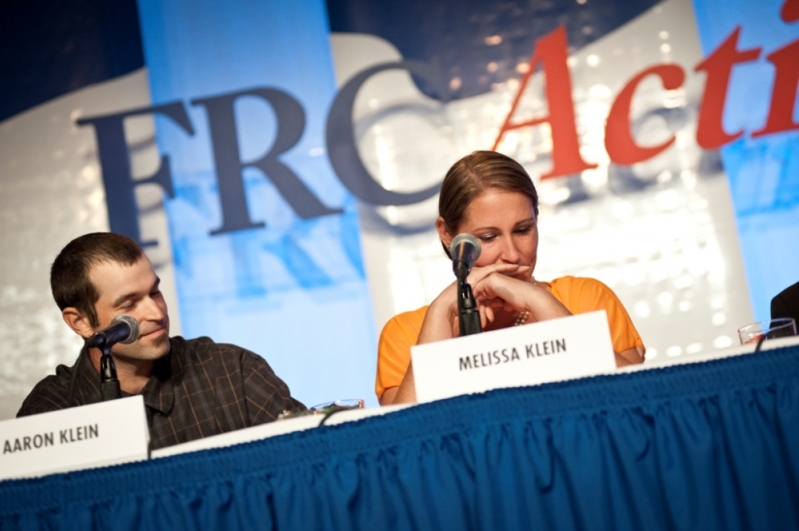
The state of Oregon has forced the Christian owners of a bakery to pay $135,000 to a lesbian couple over their refusal to bake a cake for a same-sex wedding ceremony. Now a state agency has imposed a deadline for the Christian couple to respond while simultaneously issuing a "gag order" against them.
According to Billy Hallowell of the Blaze, Oregon Bureau of Labor and Industries communications director Charlie Burr indicated that Aaron and Melissa Klein have three options: pay the sum in full, make arrangements for monthly installments, or ask for a stay. The state agency known as BOLI has given them until Monday to respond.
"[A stay of enforcement] means that they would pay nothing until the court of appeals has a chance to weigh in," Burr said.
Hallowell reported that Aaron's attorney is currently drafting a request for a stay. Klein hoped the request would freeze current demand for payment; he indicated that failure to comply would force his family to pay interest and penalties in addition to the current sum.
"I will not relent. I will continue," Klein said. "I will use every legal remedy I have to make sure that this man cannot do this to me, cannot do it to my wife, cannot do it to my five children, cannot do it to any other American."
Klein contended that the family's plight was an example of "overreach of the government."
"We're looking at the persecution of Christians in this country," Klein said, adding that he currently has no plans to "pay anything."
According to Klein, declining to pay $135,000 to Rachel and Laurel Bowman-Cryer could be financially disastrous for his family, noting that a lien could be placed on his house. He explained that the final call on the stay would come from Oregon Labor Commissioner Brad Avakian.
"They conceivably garnish my wages if I miss one payment, and they do add interest and penalties if not paid in full," Klein said.
Burr warned that "Department of Revenue or a private collection agency could assess collection fees on top of the $135,000."
"The Department of Revenue would be 16 percent; private agency could be up to 23 percent," Burr said.
However, Travis Gettys of Raw Story contended that the Bowman-Cryers were the real victims, not the Kleins. He cited language within the state agency's ruling against the Kleins to reinforce his point.
"It was foreseeable that this attention would negatively impact (the Bowman-Cryers), making (the Kleins) liable for any resultant emotional suffering experienced by (them)," BOLI wrote.
Gettys reported that Laurel Bowman-Cryer originally filed the complaint in January 2013.
"She filed her complaint by smartphone, which prevented her from seeing a disclaimer notifying her that her full name and address would be sent to the bakery owners - and Aaron Klein shared that information, along with the complaint, on his personal Facebook page," Gettys wrote.
BOLI emphasized in its ruling that the $135,000 is not a fine or civil penalty.
"This case is not about a wedding cake or a marriage," BOLI wrote. "It is about a business's refusal to serve someone because of their sexual orientation. Under Oregon law, that is illegal."
BOLI's ruling also legally required the Kleins "to cease and desist from publishing, circulating, issuing or displaying, or causing to be published ... any communication to the effect that any of the accommodations ... will be refused, withheld from or denied to, or that any discrimination be made against, any person on account of their sexual orientation." According to Hans von Spakovsky and Katrina Trinko of the Daily Signal, a website run by conservative think-tank the Heritage Foundation, that language amounted to a "gag order" against the Kleins.
"Commissioner Avakian recites in detail the statements the Kleins made that he is upset about and that his agency claims violate Oregon law," Spakovsky and Trinko wrote. "What led to his 'cease and desist' order is the key to understanding why it's accurately called a gag order that prevents the Kleins from speaking about their faith."
Spakovsky and Trinko highlighted that Avakian interpreted comments from the Kleins as "notice that discrimination will be made in the future by refusing such services," which is why he entered "cease and desist" language in the agency's ruling.
"If these personal statements of religious belief and willingness to defend themselves against government persecution can be construed as showing 'discrimination,' then pretty much almost everything the Kleins could say about their case could be construed by Oregon as showing 'discrimination,'" Spakovsky and Trinko wrote. "In other words: The Kleins are, yes, 'gagged' legally from saying much more, if anything, about their case."
Spakovsky and Trinko contended that the media seemed to be unconcerned with Akavian's attempts to impose "prior restraint" on the Kleins.
"Our constitutional traditions and Supreme Court precedent have long frowned on prior restraint of speech in any form by the government," Spakovsky and Trinko wrote. "Fortunately, the First Amendment protects all points of view, even those that may today be politically incorrect."






